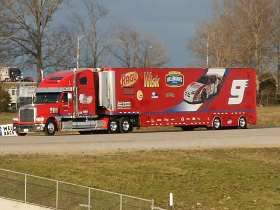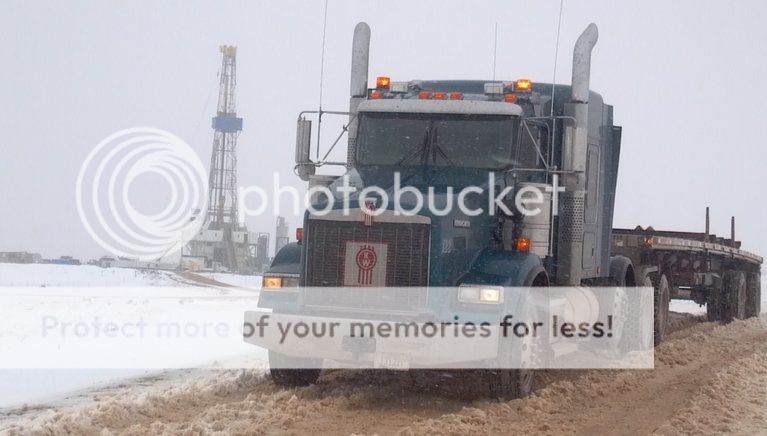I Feel Left Out On Here. Need Some Answers.....
Topic 1198 | Page 1

Its simple really. Money. Sure you make good money but when oil 'boom towns' thing cost a lot. Heck I forget the name of the place in NOrth Dakota but McDonalds works make 20 plus an hour and that's minimum wage there. Housing can up up words of a $1900 a week.
Basically boils down to you make a lot and spend a lot. The price for stuff there counters the money you make. And really the money is not as great as you make think cause if it were we would all be doing it.
Sure you can drive a truck there but you will also be working at the sites as a common laborer. Its a hard job with long hours and not much comfort.
Some of those sites are in the middle of no where. You may not see town for two to three days and I don't know about you but I would not want to go without a shower AND sleeping in my truck covered in mud,grease, oil and sweat for 3 to 4 days at a time no matter how good the money may be.
HOS:
Hours Of Service
HOS refers to the logbook hours of service regulations.
I appreciate your input guyjax. I agree with you on the rents being high in areas surrounding the oil field towns. However, as you said, "Basically boils down to you make a lot and spend a lot." It sort of contradicts what you said later....."You may not see town for two to three days and I don't know about you but I would not want to go without a shower AND sleeping in my truck covered in mud, grease, oil and sweat for 3 to 4 days at a time no matter how good the money may be."
If that is the case how can you spend your money if your too busy living in a truck and working all the time? Why pay rent? Yes, you will be covered in dirt, mud and grease living in your truck if you can deal with being filthy and getting filthy rich at the same time.
I want to suck it up for a years and make money.

If you are really serious about a driving job in the oil field, what I would do is visit one of the many oil field job fairs and talk with as many people as possible. Also, if you live near one of the booming oil fields in Texas, Dakota area, or Pennsylvania, go to truck stops and talk to the drivers pulling oil field tankers. When I was at the Flying J on the east side of San Antonio on I-10, which is near the Eagle Ford Shale, I saw many water tankers and other oil field trucks fueling. You can politely approach them and they should be happy to talk.

However, as you said, "Basically boils down to you make a lot and spend a lot." It sort of contradicts what you said later....."You may not see town for two to three days and I don't know about you but I would not want to go without a shower AND sleeping in my truck covered in mud, grease, oil and sweat for 3 to 4 days at a time no matter how good the money may be."
You don't see any towns. You have "company stores" right there on the "campus". I don't know what else to call it. 
If there isn't a company store complex, little towns pop up all over the area to take advantage of the oil boom that is happening. And as all oil booms, it only lasts for a short time. Then, like in the old west, they become ghost towns.
This was just on Discovery Channel about a week ago.
You have to pay to park your truck (this comes from a trucker friend that I knew that worked on the Alaska pipeline). And his cost back then was over 100 dollars a day. And how many years ago has that been?
You might be making great money. But when you have to pay 30 dollars for a hamburger. 10 dollars for a loaf of bread. Plus all the other marked up prices, your take home pay dwindles down pretty fast.
And as guyjax said, I would rather not have to crawl into the sleeper day after day with greasy, muddy clothes. And get a bath maybe every 3 or 4 days.
The area I live in is full of oil field workers. The money is good. But all the stories they tell and laugh at the same time. Living in a truck for a few weeks with someone while training. Try living with 12, 15, 18 other guys for 2 or 3 months in a "doghouse". Work at least 12 hours a day. And yes, you not only drive truck. You are a roustabout. You do what needs done if you are not driving.
Don't look at just the money. I am sure you have heard the old saying.... "If it sounds too good to be true, it usually is".
The oil field is not all a bed of roses and high pay.
Each driver will find what they like in driving. Me personally, I want dry van. Maybe in the future, reefer or maybe even a tanker. But oil field. That is just not for me. I like to be clean at least 2 or 3 times a weeks. 


And as far as being home weekly. Yeah, if you move your home close to where the site is. But if it is out in the middle of no where. You get home when they give you a chance. Or when they shutdown.
The driver with the Alaska pipeline. He didn't get "home" for three years. He was home a month then went back. He was under a 3 year contract. He got home when his contract was up and he was home till he signed a new contract.
And yes, I know, Alaska is not North Dakota. But it still works around the same process. You may or may not have any contract. Alaska is a long way away. That doesn't change the amount of time you will or won't get home. The job sets that pattern.
Find what you like and enjoy it.
Keep it safe out there. Joe S
Dry Van:
A trailer or truck that that requires no special attention, such as refrigeration, that hauls regular palletted, boxed, or floor-loaded freight. The most common type of trailer in trucking.Reefer:
A refrigerated trailer.
HOS:
Hours Of Service
HOS refers to the logbook hours of service regulations.DWI:
Driving While Intoxicated

I was going to reply to you the other day, but as I work in the North Dakota oil patch, Wi-Fi is basically nonexistent and cell service is hit and miss.
I can't speak for PA or OK, and you folks know my opinion of Texas  , but it ain't all it's cracked up to be. I work mainly between Nebraska, Colorado, Wyoming and the Bakken in North Dakota. I'm up here 4-6 days a week. There are so many different types of jobs to be done. Do you want to haul production water, crude oil, pipe, heavy equipment, rig and drilling equipment? The list goes on and on. There are big, national companies with headquarters in Houston and mom & pop roustabout outfits that have been eeking out a living since the last boom busted 30 years ago. Then there are a bunch of people in between. Most are decent, some, eh, not so much. It can be pretty cutthroat.
, but it ain't all it's cracked up to be. I work mainly between Nebraska, Colorado, Wyoming and the Bakken in North Dakota. I'm up here 4-6 days a week. There are so many different types of jobs to be done. Do you want to haul production water, crude oil, pipe, heavy equipment, rig and drilling equipment? The list goes on and on. There are big, national companies with headquarters in Houston and mom & pop roustabout outfits that have been eeking out a living since the last boom busted 30 years ago. Then there are a bunch of people in between. Most are decent, some, eh, not so much. It can be pretty cutthroat.
You asked for pro's and con's? Here's my take...
Con's:
-Sure, there's lots of money to be made in the oil patch. You can split it up with the 10,000 other guys who came up to make their millions. Lots of people looking to make the big bucks, sometimes four men to an open position. You gotta have some skills and experience to make yourself marketable. It is tough getting around with all the people. When the boom came, there was nowhere to put 'em. Mancamps started sprouting up everywhere. If you can find a place to stay, it's expensive. Everything is. Parking can be very pricey unless you get in early. Groceries, parts, supplies, you name it. Supply and demand. My silly little barometer is the lowly hotdog. At most convenience stores or truck stops, a hotdog is about a buck and a half. Up there, $2.50.
-Traffic sucks. I have sat in a traffic jams longer in Watford City, ND longer than I have in Chicago, St. Louis or Denver. The infrastructure wasn't set up or designed for the quantity and types of traffic. Right now, just about every road in ND is being repaired or replaced. Construction is a constant menace. Sure, they had a boom back in the late 70's to mid 80's, but the improvements made during that period have begun to reach the end of their lifespans.
-The people. Now, before you holler at me, hear me out. 99.999% of the people I interact with up there are good, hard-working folks just trying to make a living. The other .001% are the ones who give everyone a bad name. Many towns are banning trucks completely from their limits. Speeding, Jake brakes at all hours, overloads tearing stuff up, parking wherever the heck ever they want to... The city fathers are fed up with it. I just finished up a job one mile outside a little town. No trucks. Period. If you enter town with a truck, a friendly BIA DOT officer will write you a $2000.00 ticket. No if's, and's or but's. In order to get to the jobsite, we had to take an 18-mile detour on one of the worst roads I've ever been on. That 18 miles takes just about an hour. The locals either like you and accept you, or treat you with disdain. I've dealt mostly and predominately with the former, but the latter will make you wanna go home and cry to momma. This boom took off almost overnight. The nice, quite pace of life was replaced with the hustle and bustle and some people took offense.
Now, the Pro's:
-The money is pretty good. I ain't a millionaire, but I think my boss might be. But he has 400 employees and 100 trucks and has been doing this for forty years. He didn't get rich overnight. I wouldn't want his worries. I make pretty decent money, though. Good enough that my wife doesn't have to work full time and can be home before the kids get home from school. But, I'm also very prudent with my spending while on the road. I stay in my sleeper. I pack lunches and fill the fridge with groceries and bring plenty of water (5-6 gallons minimum. Sure it takes up space, but it's cheaper than paying for it...). Again, everything comes at a premium out there.
-The roads. Notice I said the roads, not the traffic. There are some of the most wonderful and beautiful places to visit and see up there. Lots of scenery and cool, old little towns. A majority of the locations you haul to are in the middle of nowhere and you are surrounded by God's majesty. One of the most memorable scenes would have to be driving north up Hwy85 real early in the morning. Pitch black, but slowly, the pink, yellow, orange of day creeps up on the dark of night, still trying to keep it's hold on the sky. A beautiful variegate of color.
The people. I've met some real characters up there. Like I said before, most are great, a few are a little less than. But, that's what makes the world go 'round.
You received responses from several people so far giving sound advice. Sorry if it isn't what you were hoping to hear, but it's just the facts. You ain't gonna go up and become incredibly wealthy right out of the gate, but you may have a heck of a good time trying. Research it out and be wary of "too-good-to-be-true" situations.
DOT:
Department Of Transportation
A department of the federal executive branch responsible for the national highways and for railroad and airline safety. It also manages Amtrak, the national railroad system, and the Coast Guard.
State and Federal DOT Officers are responsible for commercial vehicle enforcement. "The truck police" you could call them.

All great replys. Thanks guys for your input. That helped clarify a lot on oil field trucking. Thanks Joe and Flatbed.
New Reply:
New! Check out our help videos for a better understanding of our forum features

















Preview:








 TT On Facebook
TT On Facebook
I asked this question before and Tim was the only person who responded.
My question is....Is their anyone on here that has driven a truck in the oil fields such as Texas, Oklahoma or North Dakota?
OTR trucking is "ok" money, but oil field trucking is big $$$. Upwards of 100k a year. I am very surprised why more truckers are not getting into oil field trucking industry. Some companies pay high salaries and you are home weekly. Many can become millionaires in 10 years.
I'm not sure why more guys on here would rather do OTR dry van trucking versus driving for an oil field company like Chesapeake or Cactus drilling.
The oil fields is where I want to end up after I get my CDL and 1 year of OTR driving experience.
Tell me the good and bad to oil field trucking. Why aren't more guys getting into it? BTW, thanks Tim for your input. Would like to hear different opinions from everyone. Brett you too could make big money in Texas, Oklahoma or North Dakota in 10 years with your driving experience. Not sure why though.
Thanks.
CDL:
Commercial Driver's License (CDL)
A CDL is required to drive any of the following vehicles:
OTR:
Over The Road
OTR driving normally means you'll be hauling freight to various customers throughout your company's hauling region. It often entails being gone from home for two to three weeks at a time.
SAP:
Substance Abuse Professional
The Substance Abuse Professional (SAP) is a person who evaluates employees who have violated a DOT drug and alcohol program regulation and makes recommendations concerning education, treatment, follow-up testing, and aftercare.
Dry Van:
A trailer or truck that that requires no special attention, such as refrigeration, that hauls regular palletted, boxed, or floor-loaded freight. The most common type of trailer in trucking.